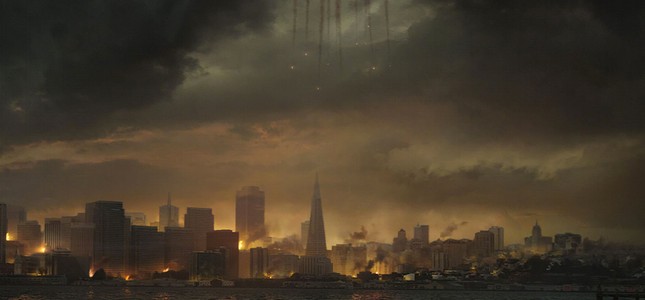
Released on the 14th May 2014, it’s probably going to go on to be the biggest blockbuster of the spring, especially with figures from the Memorial Day weekend in the US and the bank holiday weekend in the UK. It’s already taken $93 million in its first weekend in the States, indicating that it’s been a good draw for movie goers, but the question is whether or not the film will go on to be considered a classic monster movie or a well meaning hit.
The biggest problem for us is the story, which holds a few surprises for anyone that has only seen the trailer. Without wanting to give too much away, the surprise entrants into the monster movie fray change the concept of the film from what you might have been hoping to see, so that you’re left a little disappointed in what you actually get.
That aside, there are also some positives from the storyline too, which does quite a good job at trying to hone in on the human stories that are intrinsically entwined with the monstrous appearance. Focusing on the lives of the Brody family and their ongoing struggles with the frightening appearance of the larger than life inhabitants of the planet, it weaves a story that spans an impressive timescale as well as a significant geographical divide, which are both redeeming elements of the film.
While there’s a significant homage to the history of Kaiju and the Godzilla legacy, you can’t help but feel like the film starts a little too far down the evolutionary line, focusing too much on the surprise entrants more than the legendary beast itself. We’re obviously trying not to give too much away for anyone that hasn’t seen the film yet, but the reality is that it sadly does little to build the momentum for creature. He’s given a weak origin story, a lack of tangibility, grounding in nature and credible action at times, and too much mythology and demigod status, with silly references to him restoring balance making him much less rounded than he should have been.
The cast for Godzilla (2014), however, make up somewhat for the faults of the monster related elements of the script, which was written by Max Borenstein. Bryan Cranston (Argo), Juliette Binoche, Aaron Taylor-Johnson (Nowhere Boy) and Elizabeth Olsen (Kill Your Darlings) all put in strong performances to bring the plight of the family to life and inject the much needed human element into what can sometimes feel a bit like it’s just another monster movie.
Ken Watanabe (Batman Begins), who plays a military scientist trying to fathom out the truth behind the monstrous appearance is far from his best though, with a few too many wistful gazes into the great unknown. He’s sort of like the weak link between the great delivery of the Brody family cast members and the unreasonable nature of the storyline, and it’s this juxtaposition that led to high expectations being quashed in the wake of the film’s release.
His character’s main line is about a million miles away from being on the right track, even within the construct of the film. The arrogance of man is not in thinking that nature is in our control. The arrogance of man is in thinking that a supposedly deity-like figure from the deep should appear to restore balance to a broken and fractured world, even if it is a tenuous allegory.
Direction from Gareth Edwards and cinematography from Seamus McGarthy are both, on the whole, impressive throughout, despite the constraints of the storyline sending things in an unassailable trajectory. There’s great build-up to massive scale incidents and while the tension is sometimes compromised by the laughable nature of some of the onscreen delivery, there’s just enough of a grip on the darkness of the situation to keep things a little clenched in the least.
The score from legendary composer, Alexander Desplat, adds a lot to the tension on screen and combines well with epic sound to create a sense of foreboding when it’s needed. However, it isn’t quite given the vehicle it needed to instigate the fear, compassion and empathy that could have found a stronger presence in the movie.
Another downer to add to the mix is that the addition of 3D does little to improve on the movie in any way shape or form. If you’re contemplating seeing Godzilla with the slightly pricier specs, we’d probably have to say that it’s not really worth the extra doubloons, as Godzilla will doesn’t massively jump out of the screen in either format.
Visuals and fight action, on the other hand, are actually pretty impressive, with strong special effects, set construction and choreography for the epic battles that ensue. While some of the moves are frankly unfathomable, because the storyline and script doesn’t take the time, or effort, to give them enough of a semblance of rationale, you can’t argue with the onscreen dynamics in terms of visual intensity. If we’re brutally honest, though, we’d probably be inclined to tweak the styling of Godzilla ever so slightly if it were our decision to make, but it works well enough as it is.
In the end, what you’re left with is something that’s a cross between Armageddon, Independence Day, and Pacific Rim, which is a fair way away from what we were hoping for based on the trailer that preceded its release. However, despite the fact that it didn’t turn out to be what we wanted to see, we still enjoyed seeing it, to an extent, so there’s some consolation in the leviathan reboot.
Godzilla (2014) review: 3.2/5


